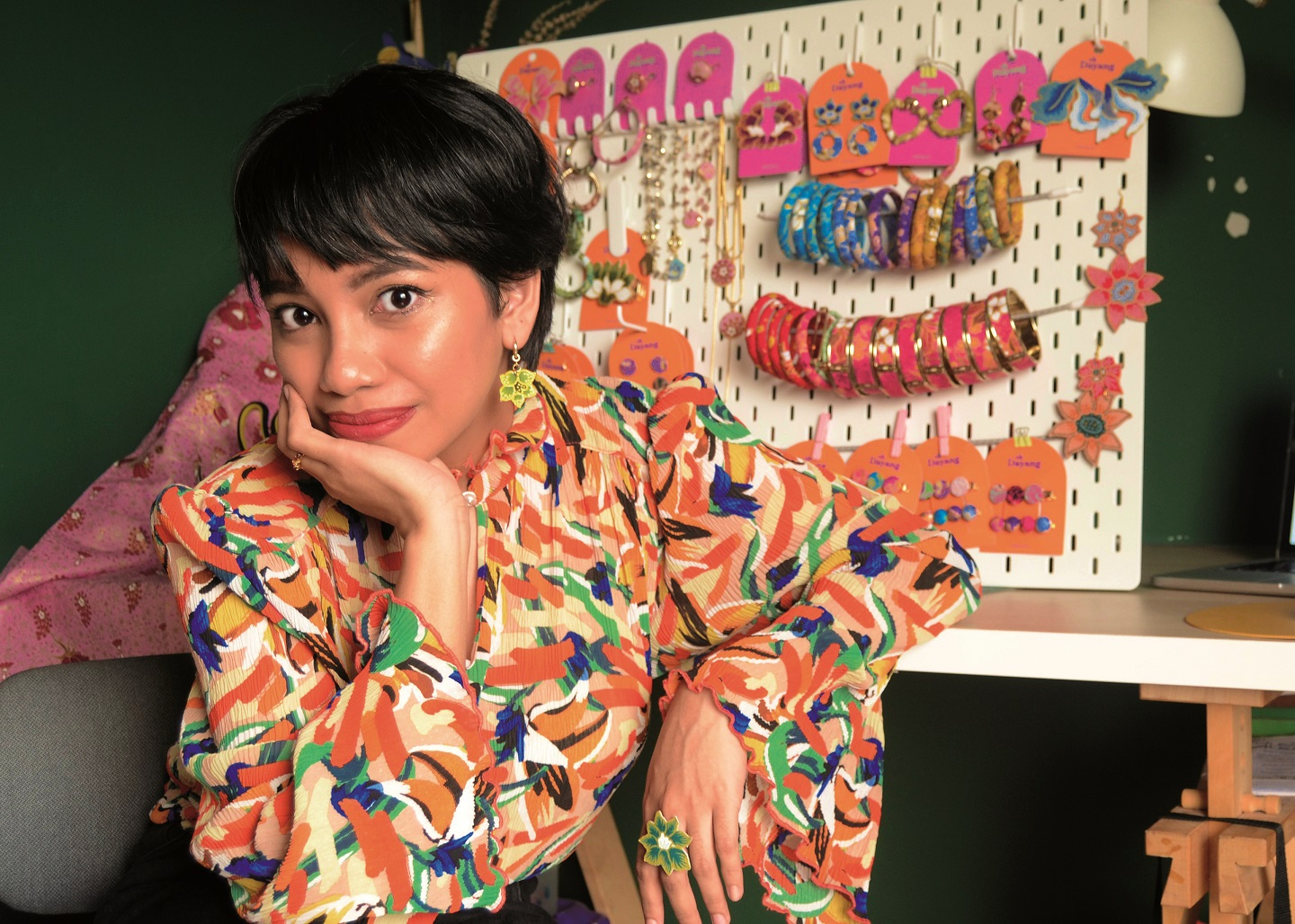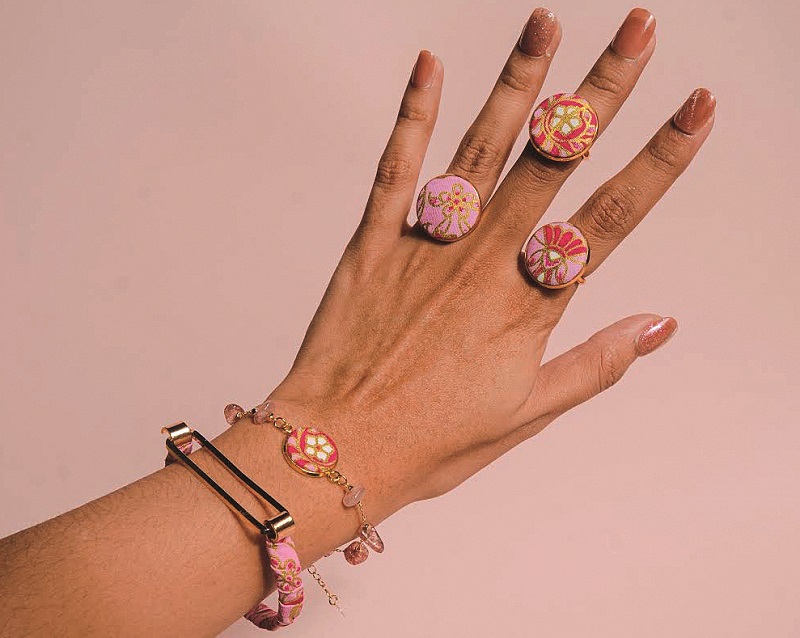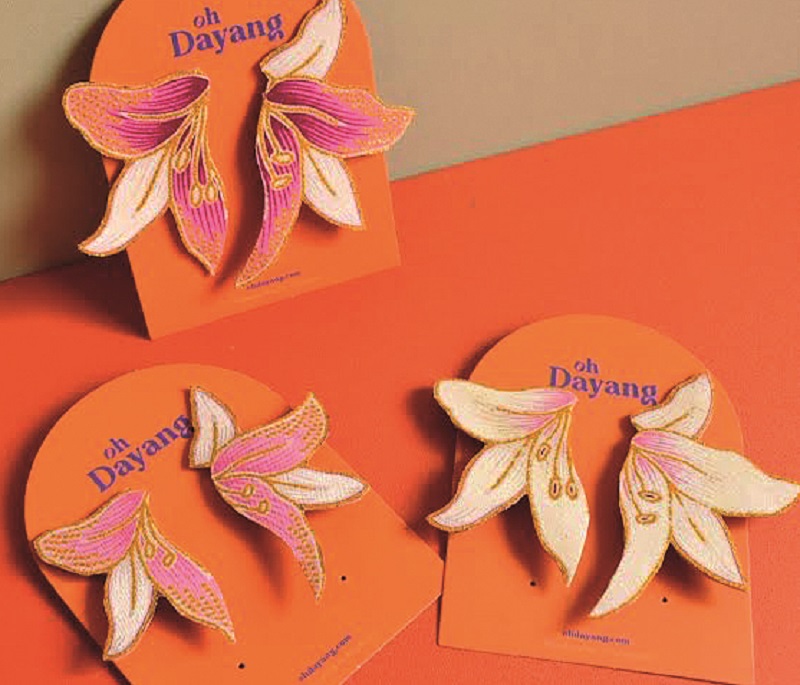
Founder Dayang Nur Syafiqah draws inspiration for new jewellery from the batik fabrics she has (All photos: Oh Dayang)
Dayang Nur Syafiqah’s entrepreneurial journey began in 2012 after she finished high school. She started by selling bracelet charms on a blog, but stopped when she furthered her studies. In 2019, she decided to set up a booth at a flea market to sell pre-loved items, including shoes, clothes, bags and baskets.
“It didn’t do well because competition was intense. Everybody else was selling the same thing. While waiting for customers to visit us, I started embellishing the earrings I was going to sell with remnants of batik fabrics that I had used when making door gifts for my wedding. I wrapped a few of the earrings using batik and put them on the table, and they sold out. We then opened an Instagram account and that’s how everything started.”
When Dayang came across creatives who made flower accessories using clay, she was inspired to use the excess fabrics with flower patterns she had on hand, turning them into earrings. The products have since become Oh Dayang’s best-sellers.
Making a minimum of one collection every month, the 27-year-old draws inspiration for new jewellery from the batik fabrics she has. Based on the patterns, she would decide on the accessories to fashion. “I make sure I use every single part of the materials.”
From using leftover textiles, Oh Dayang now sources newly produced batik to increase its production. “I’m glad we did that because it gives me more options and my creativity has blossomed as I’m not limited by the upcycled materials I have.”
img_5430.jpg

She gets the fabrics from suppliers in Terengganu and Penang. As they are handmade, she can only buy them in small quantities — up to two pieces of the same design. “That’s why I never repeat my designs and I consider them limited-edition. Once they are gone, I cannot restock them even if I wanted to.”
As for the jewellery parts, she mostly purchases them online because they are much cheaper than those sold by physical retailers. She uses gold-plated accessories that are suitable for sensitive skin.
Dayang’s goal for this business is to bridge traditional elegance with contemporary aesthetics. When deciding on the colours for a collection, she works towards having a balance between earthy and vibrant shades, so her products will be wearable on a daily basis. “If I’m doing a simple pendant necklace, it can be a bit boring. I explore things like crystals and pearls to mix around with batik, so the accessory would not look old-fashioned. I want my customers to be able to wear my creations even to their workplace.”
Having said that, she makes sure her creations are economical. “Handmade items are usually sold at a higher price point because everything takes more time to prepare. And because we don’t buy the raw materials in bulk, every little chain or hook is just expensive.
“I try to ensure my products are affordable, yet look luxurious. As long as they are beautiful, I can sell them at a reasonable price. I wouldn’t pay RM100 for a pair of earrings, so I don’t want that for my customers. I just want them to pay me for my time and ideas.”
At the height of the pandemic, the brand flourished as there was strong support for local businesses and everyone was shopping online at home. Dayang recalls not having to fork out any money for advertising during that period. “It was a blessing in disguise for makers because people spent more time on Instagram, TikTok, Facebook and YouTube.”
img_5431.jpg

As soon as the borders were reopened and restrictions lifted, however, the challenge began. She was already a mother by then, with a full-time job as a business associate at an e-commerce company. Even with her husband’s help — “He is so much more meticulous than I am” — they could not meet demand.
“I couldn’t grow as fast as I used to. Oh Dayang had the exposure and there was demand for its products, but I was not able to produce more stock since I had to look after my firstborn. Previously, it was just me and my husband, and I was also working from home at the time, so I was able to juggle the business and my work.”
Then, customers started asking when they would be able to find Oh Dayang in stores because now they wanted to feel and touch the products. Thus, the brand joined its first pop-up market last April. “It is different communicating with customers online versus offline. With the former, you have to put yourself out there by researching the algorithms. I took workshops on SEO (search engine optimisation) and marketing to understand the online business. You always have to be on your phone to edit and upload photos, as well as answer questions.
“Meanwhile, when you’re at a physical store, you can straightaway answer clients’ enquiries. It is easier to explain things and the sales move faster. Seeing their reactions to our pieces is the best part.”
The label will be participating in Sunny Side Up Market at The Row KL in conjunction with Valentine’s Day next month.
Besides taking part in more bazaars, Dayang’s goal this year is to produce more pieces per collection and keep up with demand — something the eponymous brand has been struggling with since its inception. She also plans to look into making accessories for men following requests on social media.
This article first appeared on Jan 16, 2023 in The Edge Malaysia.


